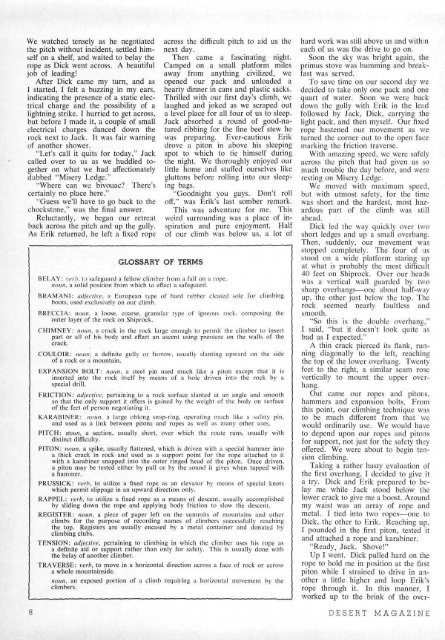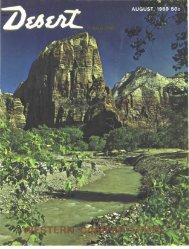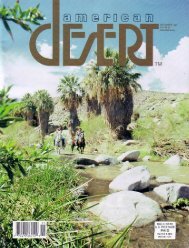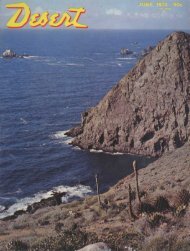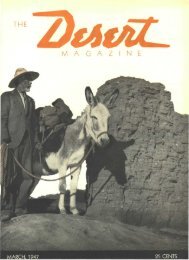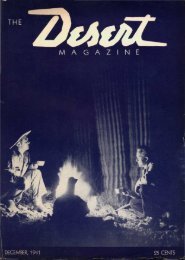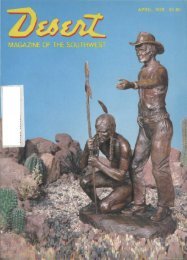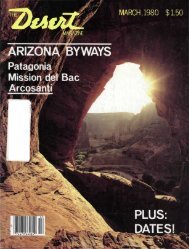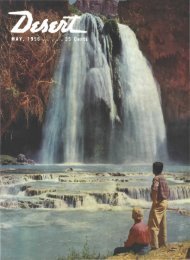World's largest catalog of jewelry parts - Desert Magazine of the ...
World's largest catalog of jewelry parts - Desert Magazine of the ...
World's largest catalog of jewelry parts - Desert Magazine of the ...
Create successful ePaper yourself
Turn your PDF publications into a flip-book with our unique Google optimized e-Paper software.
We watched tensely as he negotiated<br />
<strong>the</strong> pitch without incident, settled himself<br />
on a shelf, and waited to belay <strong>the</strong><br />
rope as Dick went across. A beautiful<br />
job <strong>of</strong> leading!<br />
After Dick came my turn, and as<br />
I started, I felt a buzzing in my ears,<br />
indicating <strong>the</strong> presence <strong>of</strong> a static electrical<br />
charge and <strong>the</strong> possibility <strong>of</strong> a<br />
lightning strike. I hurried to get across,<br />
but before I made it, a couple <strong>of</strong> small<br />
electrical charges danced down <strong>the</strong><br />
rock next to Jack. It was fair warning<br />
<strong>of</strong> ano<strong>the</strong>r shower.<br />
"Let's call it quits for today," Jack<br />
called over to us as we huddled toge<strong>the</strong>r<br />
on what we had affectionately<br />
dubbed "Misery Ledge."<br />
"Where can we bivouac? There's<br />
certainly no place here."<br />
"Guess we'll have to go back to <strong>the</strong><br />
chockstone," was <strong>the</strong> final answer.<br />
Reluctantly, we began our retreat<br />
back across <strong>the</strong> pitch and up <strong>the</strong> gully.<br />
As Erik returned, he left a fixed rope<br />
GLOSSARY OF TERMS<br />
BELAY: verb, to safeguard a fellow climber from a fall on a rope.<br />
noun, a solid position from which to effect a safeguard.<br />
across <strong>the</strong> difficult pitch to aid us <strong>the</strong><br />
next day.<br />
Then came a fascinating night.<br />
Camped on a small platform miles<br />
away from anything civilized, we<br />
opened our pack and unloaded a<br />
hearty dinner in cans and plastic sacks.<br />
Thrilled with our first day's climb, we<br />
laughed and joked as we scraped out<br />
a level place for all four <strong>of</strong> us to sleep.<br />
Jack absorbed a round <strong>of</strong> good-natured<br />
ribbing for <strong>the</strong> fine beef stew he<br />
was preparing. Ever-cautious Erik<br />
drove a piton in above his sleeping<br />
spot to which to tie himself during<br />
<strong>the</strong> night. We thoroughly enjoyed our<br />
little home and stuffed ourselves like<br />
gluttons before rolling into our sleeping<br />
bags.<br />
"Goodnight you guys. Don't roll<br />
<strong>of</strong>f," was Erik's last somber remark.<br />
This was adventure for me. This<br />
weird surrounding was a place <strong>of</strong> inspiration<br />
and pure enjoyment. Half<br />
<strong>of</strong> our climb was below us, a lot <strong>of</strong><br />
BRAMANI: adjective, a European type <strong>of</strong> hard rubber cleated sole for climbing<br />
boots, used exclusively on our climb.<br />
BRECCIA: noun, a loose, coarse, granular type <strong>of</strong> igneous rock, composing <strong>the</strong><br />
outer layer <strong>of</strong> <strong>the</strong> rock on Shiprock.<br />
CHIMNEY: noun, a crack in <strong>the</strong> rock large enough to permit <strong>the</strong> climber to insert<br />
part or all <strong>of</strong> his body and effect an ascent using pressure on <strong>the</strong> walls <strong>of</strong> <strong>the</strong><br />
crack.<br />
COULOIR: noun, a definite gully or furrow, usually slanting upward on <strong>the</strong> side<br />
<strong>of</strong> a rock or a mountain.<br />
EXPANSION BOLT: noun, a steel pin used much like a piton except that it is<br />
inserted into <strong>the</strong> rock itself by means <strong>of</strong> a hole driven into <strong>the</strong> rock by a<br />
special drill.<br />
FRICTION: adjective, pertaining to a rock surface slanted at an angle and smooth<br />
so that <strong>the</strong> only support it <strong>of</strong>fers is gained by <strong>the</strong> weight <strong>of</strong> <strong>the</strong> body on surface<br />
<strong>of</strong> <strong>the</strong> feet <strong>of</strong> person negotiating it.<br />
KARABINER: noun, a large oblong snap-ring, operating much like a safety pin.<br />
and used as a link between pitons and ropes as well as many o<strong>the</strong>r uses.<br />
PITCH: rtoun, a section, usually short, over which <strong>the</strong> route runs, usually with<br />
distinct difficulty.<br />
PITON: noun, a spike, usually flattened, which is driven with a special hammer into<br />
a thick crack in rock and used as a support point for <strong>the</strong> rope attached to it<br />
with a karabiner snapped into <strong>the</strong> outer ringed head <strong>of</strong> <strong>the</strong> piton. Once driven,<br />
a piton may be tested ei<strong>the</strong>r by pull or by <strong>the</strong> sound it gives when tapped with<br />
a hammer.<br />
PRUSSICK: verb, to utilize a fixed rope as an elevator by means <strong>of</strong> special knots<br />
which permit slippage in an upward direction only.<br />
RAPPEL: verb, to utilize a fixed rope as a means <strong>of</strong> descent, usually accomplished<br />
by sliding down <strong>the</strong> rope and applying body friction to slow <strong>the</strong> descent.<br />
REGISTER: noun, a piece <strong>of</strong> paper left on <strong>the</strong> summits <strong>of</strong> mountains and o<strong>the</strong>r<br />
climbs for <strong>the</strong> purpose <strong>of</strong> recording names <strong>of</strong> climbers successfully reaching<br />
<strong>the</strong> top. Registers are usually encased by a metal container and donated by<br />
climbing clubs.<br />
TENSION: adjective, pertaining to climbing in which <strong>the</strong> climber uses his rope as<br />
a definite aid or support ra<strong>the</strong>r than only for safety. This is usually done with<br />
<strong>the</strong> belay <strong>of</strong> ano<strong>the</strong>r climber.<br />
TRAVERSE: verb, to move in a horizontal direction across a face <strong>of</strong> rock or across<br />
a whole mountainside.<br />
noun, an exposed portion <strong>of</strong> a climb requiring a horizontal movement by <strong>the</strong><br />
climbers.<br />
hard work was still above us and with n<br />
each <strong>of</strong> us was <strong>the</strong> drive to go on.<br />
Soon <strong>the</strong> sky was bright again, <strong>the</strong><br />
primus stove was humming and breakfast<br />
was served.<br />
To save time on our second day v/e<br />
decided to take only one pack and one<br />
quart <strong>of</strong> water. Soon we were back<br />
down <strong>the</strong> gully with Erik in <strong>the</strong> lead<br />
followed by Jack, Dick, carrying <strong>the</strong><br />
light pack, and <strong>the</strong>n myself. Our fixed<br />
rope hastened our movement as v/e<br />
turned <strong>the</strong> corner out to <strong>the</strong> open face<br />
marking <strong>the</strong> friction traverse.<br />
With amazing speed, we were safely<br />
across <strong>the</strong> pitch that had given us so<br />
much trouble <strong>the</strong> day before, and were<br />
resting on Misery Ledge.<br />
We moved with maximum speed,<br />
but with utmost safety, for <strong>the</strong> time<br />
was short and <strong>the</strong> hardest, most hazardous<br />
part <strong>of</strong> <strong>the</strong> climb was still<br />
ahead.<br />
Dick led <strong>the</strong> way quickly over two<br />
short ledges and up a small overhang.<br />
Then, suddenly, our movement was<br />
stopped completely. The four <strong>of</strong> us<br />
stood on a wide platform staring up<br />
at what is probably <strong>the</strong> most difficult<br />
40 feet on Shiprock. Over our heads<br />
was a vertical wall guarded by tv/o<br />
sharp overhangs—one about half-way<br />
up, <strong>the</strong> o<strong>the</strong>r just below <strong>the</strong> top. The<br />
rock seemed nearly faultless and<br />
smooth.<br />
"So this is <strong>the</strong> double overhang,"<br />
I said, "but it doesn't look quite as<br />
bad as I expected."<br />
A thin crack pierced its flank, running<br />
diagonally to <strong>the</strong> left, reaching<br />
<strong>the</strong> top <strong>of</strong> <strong>the</strong> lower overhang. Twenty<br />
feet to <strong>the</strong> right, a similar seam rose<br />
vertically to mount <strong>the</strong> upper overhang.<br />
Out came our ropes and pitons,<br />
hammers and expansion bolts. From<br />
this point, our climbing technique was<br />
to be much different from that we<br />
would ordinarily use. We would have<br />
to depend upon our ropes and pitons<br />
for support, not just for <strong>the</strong> safety <strong>the</strong>y<br />
<strong>of</strong>fered. We were about to begin tension<br />
climbing.<br />
Taking a ra<strong>the</strong>r hasty evaluation <strong>of</strong><br />
<strong>the</strong> first overhang, I decided to give it<br />
a try. Dick and Erik prepared to belay<br />
me while Jack stood below <strong>the</strong><br />
lower crack to give me a boost. Around<br />
my waist was an array <strong>of</strong> rope and<br />
metal. I tied into two ropes—one to<br />
Dick, <strong>the</strong> o<strong>the</strong>r to Erik. Reaching up,<br />
I pounded in <strong>the</strong> first piton, tested it<br />
and attached a rope and karabiner.<br />
"Ready, Jack. Shove!"<br />
Up I went. Dick pulled hard on <strong>the</strong><br />
rope to hold me in position at <strong>the</strong> fiist<br />
piton while I strained to drive in ano<strong>the</strong>r<br />
a little higher and loop Erik's<br />
rope through it. In this manner, I<br />
worked up to <strong>the</strong> brink <strong>of</strong> <strong>the</strong> over-<br />
DESERT MAGAZINE


